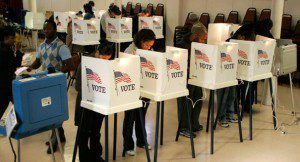After winning access to a U.S. Department of Homeland Security database of non-citizens living in Florida, Gov. Rick Scott said he sees no reason why the state’s 67 elections supervisors shouldn’t return to removing ineligible voters from the rolls.
But the supervisors, many of whom have resisted the purge, say they’re not ready to trust the new lists without reviewing them first – especially with less than four months remaining until the November election.
“My worst nightmare is we get close to a presidential election, and someone challenges maybe 100,000 possible non-citizens at the polls on Election Day,” said Volusia County Supervisor of Elections Ann McFall. “If that happens, we won’t get our results for weeks.”
The state appeared to win a months-long struggle with the federal government Saturday over use of the Systematic Alien Verification for Entitlements, or SAVE, database. The state maintained that it had the right to use the list, while DHS said Florida hadn’t provided all the information needed for that. The state eventually sued the feds for access to the database, and Florida officials said in recent weeks they’ve supplied the information the feds wanted.
Florida Secretary of State Ken Detzner quickly sent a letter Saturday to elections supervisors, suggesting that the SAVE material would allow the purge to resume.
“You know, it’s very reliable data, so I can’t imagine they’re not going to go forward and make sure,” Scott told CNN Monday. “‘Cause I don’t know anybody – any supervisor of elections or anybody in our state – that thinks non-U.S. citizens ought to be voting in our races.”
In his letter, Detzner said the state and the federal government plan to sign an agreement allowing the state to use the database “very soon.” But as McFall noted, the letter also acknowledged that lists previously provided for the purge – by the Florida Department of State and Department of Highway Safety and Motor Vehicles – “should be considered obsolete.”
“The letter admits that the existing file they gave us is now outdated and should not be used,” McFall said. “So what happens when this next list comes out?”
Vicki Davis, president of the Florida State Association of Supervisors of Elections and the supervisor in Martin County, said the association’s executive committee is meeting Tuesday to map out its strategy. And in speaking to Detzner, Davis said, she came away with the understanding that the data might not be available until after the statewide primary on Aug. 14.
“It’s going to take time to finalize the process,” she said.
Leon County Supervisor of Elections Ion Sancho agreed that the supervisors don’t know when they’ll get the lists or how accurate they’ll be.
He said Scott and Detzner are inexperienced at running statewide elections.
“But those who have been here in 2000 and 2004 realize that if you produce a list that’s highly inaccurate, in all probability what you’re going to do is disenfranchise legal voters, and I’m sure that’s not what anybody wants to do,” he said.
Voting rights groups are also worried about the timing.
They say purging the rolls so soon before a presidential election could disenfranchise voters – to the advantage of GOP candidates.
But while the dispute has been called a political one, McFall, like Scott, is a Republican.
“I think half the supervisors [of elections] are Republicans,” she said. “But we’re pretty tight on this and all in it together.”
By Margie Menzel



